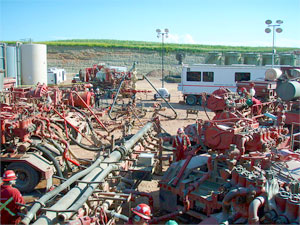 A fracking operation
As a geologist, I’ve followed the fracking news with interest.
A fracking operation
As a geologist, I’ve followed the fracking news with interest.
I am well aware that we live on a finite planet, and that by far the best answer to humanity’s increasing demand for resources would be a reduction in global population coupled with more efficient, and environmental friendly, energy usage.
In the meantime, we in the UK face a national problem. We rely on gas for a lot of our energy. It’s cleaner than coal, but we’re running out. I’m very uneasy about relying on Russia and other eastern nations to supply a major fraction of our energy needs, which is the prospect we face if we don’t produce gas of our own.
Fortunately, there is a solution that could provide half a century’s supply of gas for the UK, by the end of which time we can hope that nuclear fusion, geothermal or renewable energy generation will have matured enough to take over.
The solution is to use the methane gas that is trapped in shale, which makes up about 50% of the sedimentary rock that underlies much of the UK. The way to get at this is by hydraulic fracturing (fracking), which releases the trapped gas so that it can be collected.
It really pains me that fracking has got such a bad press. Some mistakes seem to have been made in the USA, where bad practice may have allowed contaminant to seep into the shallow water table, and thence into the tap-water of homes using borehole water supplies. Correct procedures would avoid that in the UK, as indeed in most of the USA where fracking procedes very nicely, thank you.
Then there’s the issue of fracking causing ‘earthquakes’. This needs some context. The Earth’s interior is trembling all the time. As I type this, I see that in the British Isles there were nineteen earthquakes ranging in magnitude from 0.7 to 3.3 in the past 50 days. You can check for yourself here. These were all natural. Few of them were strong enough to be noticed even by the people nearest to them, and there will have been hundreds more too small to be worth recording by instruments.
In 2011 there were two ‘earthquakes’ caused by fracking in Lancashire. These were magnitude 2.3 and 1.5. To call such events ‘earthquakes’ make them seem far more spectacular than they were. Earth tremors would be more appropriate. No damage was done, but fracking was halted while an independent investigation was carried out. This concluded that fracking had ‘unlocked’ a previously stressed fault, and allowed it to slip. Basically, there would have been an ‘earthquake’ there eventually (maybe not for hundreds of years), and the fracking just made it happen early.
This was a useful experience for scientists and engineers, and there is now an agreed protocol to halt or pause future fracking activities if any unusual seismicity is noted.
What no one seems to have pointed out is that by releasing a locked fault prematurely, the resulting earthquake is smaller than if the stress had been allowed to continue its natural slow build up to the point when it let rip with a larger, but entirely natural earthquake decades or centuries into the future.
So, my informed opinion as a geologist, is that properly conducted fracking is not a threat to the local environment, and could be a short- to mid-term solution to our energy needs.
Rate and Review
Rate this article
Review this article
Log into OpenLearn to leave reviews and join in the conversation.
Article reviews
Roy Marler - 9 November 2013 7:05am
It's good to see some sensible discussion on fracking. Surely there are other issues though. I was under the impression that fracking required large quantities of water, something that is potentially in short supply in this country? There have been cases in America where there has been a water shortage in fracking communities with priority on supplies being given to the fracking operations over the local communities.
Julia Trachsel - 10 November 2013 6:25pm
A fracking project in British Columbia, Canada in 2010...Quote: "2010 Apache Oil proclaimed that it had completed the largest fracking job ever in the Horn River Basin (BC) ever – requiring 195 million gallons of fresh water."
Another quote "there was some shale gas exploration and experimentation in Quebec, Canada, until recently when it was discovered that more than half the wells were leaking." A moratorium has been called in Quebec until this can be studied further.
So... my concern, based on the facts of the Canadian experience so far, is that this is not a perfect science. There are many pitfalls that need to be studied before fracking is widely implemented. Global warming may be causing the ocean waters to rise, but that trend is not adding to our resources of fresh water, and the many people who depend on this resource, especially in an uncontaminated state from wells in their backyards. At least in rural Canada, this is how we get our water.
Julia Trachsel - 10 November 2013 6:28pm
Sorry, meant to include the link to the New Brunswick, Canada, Fracking website where I obtained the quotes in used in my comment.
http://nbfrackingresearch.com/
I find no harm in the method of gaining the gas, although this seems to concern the media more than the fact that we would be chasing fossil fuels when we are supposed to be reducing our reliance on them.